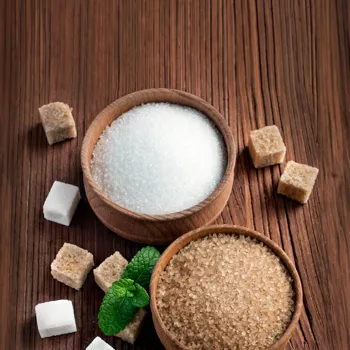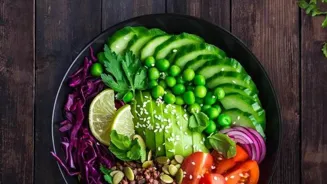Discover how to improve your diet with 10 simple changes! Boost your well-being starting today
In today's fast-paced world, keeping track of what we eat can be a real struggle. We often grab whatever is
easiest, leading to unhealthy eating habits over time. But don't worry, getting healthier doesn't require a complete overhaul!
Small, manageable changes to your diet can make a big difference in your overall well-being. This article will walk you through ten simple yet effective adjustments you can make to your eating habits starting today.
These changes focus on adding nutrients, cutting back on processed foods, and making mindful choices that will leave you feeling energized and ready to tackle anything. Let's dive in and discover how easy it can be to nourish your body better!
Start Your Day with a Powerhouse Breakfast
Breakfast truly is the most important meal of the day. Skipping it often leads to overeating later on and can leave you feeling sluggish and unfocused. Instead of reaching for a sugary cereal or a processed breakfast bar, opt for something packed with nutrients and energy.

Think about a bowl of whole-grain oats topped with fresh fruits like berries and a sprinkle of nuts. This combination provides complex carbohydrates for sustained energy, fiber to keep you feeling full, and antioxidants from the berries.
Another great option is a smoothie made with yogurt, spinach, banana, and some chia seeds. The yogurt provides protein and calcium, the spinach adds vitamins, the banana offers potassium, and chia seeds contribute healthy fats and fiber.
A good breakfast sets the tone for a day of healthy eating and helps regulate your blood sugar levels. Remember, it's all about fuelling your body with good stuff from the very start. It's key to remember a healthy breakfast will keep you fuller and more energetic during the day.
Hydrate Like a Pro: Water is Your Best Friend
Many of us often mistake thirst for hunger, leading to unnecessary snacking. Dehydration can also cause headaches, fatigue, and poor concentration. Make water your go-to beverage throughout the day. Carry a reusable water bottle with you and sip on it regularly.

Aim for at least eight glasses of water daily, and increase that amount if you're physically active or live in a hot climate. If plain water feels boring, infuse it with slices of cucumber, lemon, or mint for a refreshing twist.
Avoid sugary drinks like sodas and juices, as these are loaded with empty calories and can contribute to weight gain and other health problems. Staying hydrated not only quenches your thirst but also helps with digestion, nutrient absorption, and overall bodily functions.
Water is quite important for our health, we must keep in mind to drink plenty of water.
Embrace the Rainbow: Eat More Fruits and Vegetables
Fruits and vegetables are packed with vitamins, minerals, fiber, and antioxidants, all essential for maintaining optimal health. Aim to fill half your plate with fruits and vegetables at every meal.
Choose a variety of colors - red tomatoes, orange carrots, green spinach, purple eggplants, and so on - to ensure you're getting a wide range of nutrients.
Add berries to your breakfast oatmeal, snack on carrot sticks with hummus, toss a salad with your lunch, and include roasted vegetables with your dinner. Fruits and vegetables are naturally low in calories and high in fiber, making them a great way to feel full and satisfied without overeating.
They also protect against chronic diseases like heart disease, diabetes, and certain types of cancer. Make sure that we add enough fruits and vegetables to our diet, to get the required nurtrients.
Swap Processed Snacks for Healthy Alternatives
Processed snacks like chips, cookies, and candies are often high in sugar, unhealthy fats, and sodium, and low in nutrients. These can lead to weight gain, energy crashes, and other health problems.
Instead, opt for healthier snack alternatives like a handful of almonds or walnuts, a piece of fruit, a small bowl of yogurt, or a handful of roasted chana. These snacks provide sustained energy, healthy fats, and essential nutrients.
Planning your snacks ahead of time can help you avoid impulsive, unhealthy choices when hunger strikes. Healthy snacks are convenient, portable, and satisfying and provide energy. Ensure you eat healthy snacks during the day and to avoid other sugar products.
Cook More Meals at Home: Take Control of Your Ingredients
Eating out frequently can make it difficult to control what goes into your food. Restaurant meals are often higher in calories, unhealthy fats, and sodium than home-cooked meals. Cooking at home allows you to choose fresh, wholesome ingredients and control portion sizes.
Start by planning your meals for the week and making a grocery list. Try simple recipes that use whole grains, lean proteins, and plenty of vegetables. Experiment with different spices and herbs to add flavor without adding extra salt or sugar.
Cooking at home can also be a fun and relaxing activity, and it's a great way to involve your family in healthy eating habits. Home cooked food is always the best and gives you the ability to choose the ingredients.
Read Food Labels: Be a Savvy Shopper
Becoming a savvy shopper starts with reading food labels carefully. Pay attention to the serving size, calories per serving, and the amounts of fat, sugar, and sodium. Look for foods that are low in saturated and trans fats, added sugars, and sodium, and high in fiber, vitamins, and minerals.
Be aware of hidden sugars and artificial sweeteners, which can sabotage your healthy eating efforts. Compare different products to find the healthiest option. Reading food labels empowers you to make informed choices about what you're putting into your body.
It keeps us informed on what we are consuming in daily life.
Portion Control: Mind Your Serving Sizes
Even healthy foods can contribute to weight gain if you're eating too much of them. Be mindful of portion sizes and avoid overeating. Use smaller plates and bowls to help control your portions. Read the serving size information on food labels and stick to the recommended amount.
Pay attention to your body's hunger and fullness cues. Eat slowly and savor each bite, stopping when you feel satisfied, not stuffed. Portion control is essential for maintaining a healthy weight and preventing overeating.
Its important to read the label before consuming and it will keep us in check.
Choose Whole Grains Over Refined Grains
Whole grains like oats, brown rice, quinoa, and whole-wheat bread are packed with fiber, vitamins, and minerals. Refined grains, like white bread, white rice, and sugary cereals, have been stripped of these nutrients.

Choosing whole grains over refined grains can help improve your digestion, regulate your blood sugar levels, and keep you feeling full for longer. Swap white bread for whole-wheat bread, white rice for brown rice, and sugary cereals for oatmeal.
Whole grains are a much healthier option and contribute to better overall health. Whole grains makes us more energetic.
Limit Added Sugars: Sweeten Responsibly
Added sugars are hidden in many processed foods and drinks, and they can contribute to weight gain, tooth decay, and other health problems. Limit your intake of sugary drinks like sodas and juices, and be mindful of hidden sugars in processed foods like sauces, dressings, and baked goods.

Opt for natural sweeteners like honey or maple syrup in moderation. Train your taste buds to enjoy the natural sweetness of fruits and vegetables. Reducing your intake of added sugars can have a significant impact on your overall health and well-being.
Try to pick more natural sugars, that is better.
Be Mindful of Your Eating Habits: Pay Attention to the Present Moment
Mindful eating involves paying attention to your food, your body's hunger and fullness cues, and your emotional state while eating. Avoid distractions like watching television or scrolling through your phone while eating.
Sit down at a table, savor each bite, and focus on the flavors and textures of your food. Pay attention to your body's signals and stop eating when you feel satisfied, not stuffed. Mindful eating can help you develop a healthier relationship with food and prevent overeating.
This is a great life lesson to practice when eating and enjoying the pleasure of food.
By incorporating these ten simple changes into your daily routine, you can significantly improve your diet and your overall health.
Remember, it's not about making drastic changes overnight, but about making small, sustainable adjustments that will lead to long-term results. Start with one or two changes that feel manageable for you, and gradually add more as you become more comfortable. You can reach your health goals!
Remember you are what you eat!
AI Generated Content. Glance/InMobi shall have no liability for the content












